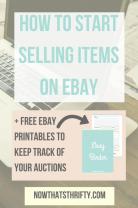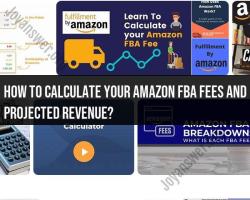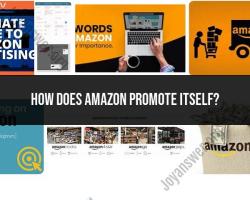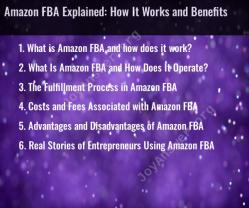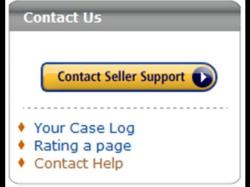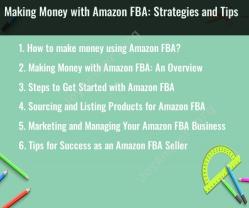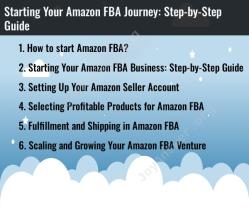How much money you need to start Amazon FBA?
The amount of money you need to start an Amazon FBA (Fulfillment by Amazon) business can vary widely depending on several factors. Here are some key financial considerations to help you budget for starting an Amazon FBA business:
Product Sourcing and Manufacturing:
- Costs related to sourcing or manufacturing your products.
- Includes the cost of goods, shipping, and any import duties or taxes.
Initial Inventory:
- Sufficient funds to purchase an initial inventory of products.
- Consider the Minimum Order Quantity (MOQ) and negotiate with suppliers.
Amazon FBA Fees:
- Upfront costs for Amazon FBA fees (referral fees, fulfillment fees, storage fees, etc.).
- Use the Amazon FBA calculator to estimate fees for your specific products.
Shipping to Amazon:
- Budget for shipping your products to Amazon's fulfillment centers.
- Consider freight, customs, and any other shipping-related costs.
Product Photography and Listing Optimization:
- Budget for high-quality product photography.
- Consider hiring professionals for listing optimization.
Packaging:
- Costs associated with packaging your products.
- Ensure compliance with Amazon's packaging requirements.
Brand Registry and Trademarks:
- Consider registering your brand with Amazon.
- Budget for any trademark-related expenses.
Marketing and Advertising:
- Set aside funds for marketing and advertising.
- Use Amazon PPC (Pay-Per-Click) campaigns to promote your products.
Software Tools and Services:
- Budget for essential tools and services, such as inventory management, analytics, and repricing software.
Business Registration and Compliance:
- Costs associated with business registration, licenses, and compliance.
- Consult with professionals to ensure legal and tax compliance.
Contingency Fund:
- Set aside a contingency fund for unexpected expenses or fluctuations in cash flow.
Professional Services:
- Consider consulting with professionals like accountants or legal experts for business setup and compliance.
It's challenging to provide an exact figure as the startup costs can vary based on the type of products you're selling, the scale of your operation, and other factors. However, a rough estimate for a small-scale Amazon FBA business could range from a few thousand dollars to tens of thousands of dollars.
Before diving in, conduct thorough market research, create a detailed business plan, and factor in all potential expenses. It's crucial to be realistic about your budget and have a clear understanding of the costs involved in running an Amazon FBA business.
1. Essential Initial Costs for an Amazon FBA Business:
Starting an Amazon FBA business involves several initial costs, which can be categorized into:
Product Costs:
- Product sourcing: This includes the cost of purchasing your product from a supplier, including wholesale price, shipping, and import duties.
- Packaging: Costs involved in creating attractive and product-appropriate packaging.
- Product photography: High-quality product images are crucial for attracting customers.
- Product testing and certification: Meeting regulatory compliance for your product category.
Business Setup Costs:
- Amazon Seller account: Choose between Individual or Professional selling plans based on your selling volume.
- UPC codes: Unique product identifiers required by Amazon.
- Business licenses and permits: Depending on your location and product category.
- Legal and accounting fees: Setting up your business entity and ensuring financial compliance.
Marketing and Advertising Costs:
- Product research and keyword research: Identifying profitable products and relevant keywords to attract customers.
- PPC advertising: Pay-per-click advertising campaigns to increase product visibility.
- Social media marketing and influencer marketing: Building brand awareness and driving traffic to your listings.
Amazon FBA Fees:
- Fulfillment fees: Fees for picking, packing, and shipping your products to customers.
- Storage fees: Monthly fees for storing your inventory in Amazon's warehouses.
- Other fees: Additional fees may apply for returns processing, oversized items, and removal orders.
Additional Costs:
- Inventory management software: Tools to track inventory levels and optimize logistics.
- Product liability insurance: Protecting yourself from potential legal liabilities.
- Office supplies and equipment: Computers, software, and other essential tools.
2. Minimizing Startup Expenses for Amazon FBA:
While starting an Amazon FBA business requires investment, several strategies can help minimize initial costs:
Product Selection:
- Start with a low-cost product with high demand and low competition.
- Consider private label products to control branding and potentially lower costs.
- Source products from suppliers offering good wholesale prices and low MOQs (minimum order quantities).
Marketing and Advertising:
- Focus on organic search optimization (SEO) to improve product ranking and reduce reliance on paid advertising.
- Utilize free marketing channels like social media, email marketing, and influencer outreach.
- Start with small-budget PPC campaigns and optimize them for maximum return on investment.
Operational Efficiency:
- Utilize Amazon's FBA tools to manage inventory effectively and avoid unnecessary storage fees.
- Negotiate competitive shipping rates with suppliers or freight forwarders.
- Outsource tasks like product photography and graphic design to find cost-effective options.
Alternative Options:
- Consider starting with wholesale or arbitrage models instead of private label to reduce upfront product costs.
- Join product launch groups or communities to leverage shared resources and knowledge.
- Seek mentorship or coaching from experienced Amazon sellers to learn best practices and avoid costly mistakes.
By carefully planning and strategically allocating resources, you can minimize startup expenses and increase your chances of success in the competitive world of Amazon FBA. Remember, starting small and scaling gradually is often a wiser approach than overspending in the early stages.



